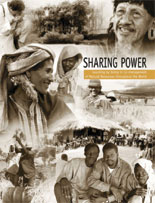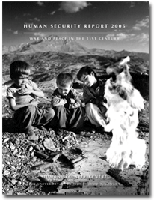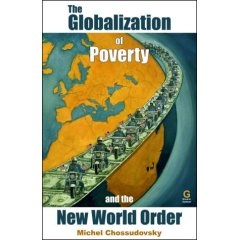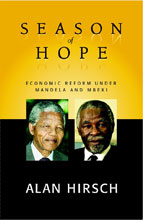
Le portail rinoceros d’informations sur les initiatives citoyennes pour la construction d’un autre monde a été intégré au nouveau site Ritimo pour une recherche simplifiée et élargie.
Ce site (http://www.rinoceros.org/) constitue une archive des articles publiés avant 2008 qui n'ont pas été transférés.
Le projet rinoceros n’a pas disparu, il continue de vivre pour valoriser les points de vue des acteurs associatifs dans le monde dans le site Ritimo.
Pages 1 | 2 | 3 | 4 | 5 | 6 | 7 | 8 | 9
, , ,
Sharing power
Learning by doing in Co-Management of Natural Resources throughout the World
> By Grazia Borrini-Feyerabend, Michel Pimbert, M. Taghi Farvar, Ashish Kothari and Yves Renard; with Hanna Jaireth, Marshall Murphree, Vicki Pattemore, Ricardo Ramirez and Patrizio Warren, IIED and IUCN/ CEESP/ CMWG, Cenesta, Tehran, 2004, 435p., PDF
http://www.iucn.org/about/union/comm (...)
This book is designed to support professionals and citizens at large who wish both to better understand collaborative management processes and to develop and enhance them in practice. From a recollection of the political and socio-cultural history of human relationships with nature, the volume moves into a more conceptual analysis of actors, entitlements, equity and co-management itself. Co-management as a process is then unpacked and explored in detail, from its roots in local systems of solidarity to the unlikely and very powerful “syncretic” merging of traditional practices and modern conservation expertise.
Developing countries losing out in cultural trade
> UNESCO Institute for Statistics, 2005-12-15
http://www.uis.unesco.org/ev_en.php? (...)
Three countries - the United Kingdom, United States and China - produced 40 percent of the world’s cultural trade products in 2002, while Latin America and Africa together accounted for less than four percent according to a new report published by the UNESCO Institute for Statistics.
Entitled, International Flows of Selected Cultural Goods and Services, 1994-2003, the report analyses cross-border trade data from about 120 countries on selected products, such as books, CDs, videogames and sculptures.
The Human Security Report 2005
> Oxford University Press, October 2005
http://www.humansecurityreport.info/ (...)
The first Human Security Report documents a dramatic, but largely unknown, decline in the number of wars, genocides and human rights abuse over the past decade. Published by Oxford University Press, the Report argues that the single most compelling explanation for these changes is found in the unprecedented upsurge of international activism, spearheaded by the UN, which took place in the wake of the Cold War. The report is available in PDF format for free. Also available: Figures from the Report, Links, and Data Sources.
Read articles made from the Report:
- UN makes the world a safer place, Hong Kong Standard (Jan. 3)
- A world becoming more peaceful?, openDemocracy (Oct. 17)
- Wars ’less frequent, less deadly’, BBC (Oct. 17)
- FACTS AND FIGURES: Human Security Report 2005 Fact Sheet: A less violent world: Numbers of conflicts, 1946-2003 (pdf), Human Security Centre
The Globalization of Poverty and the New World Order
> Global Outlook; 2nd edition (September 9, 2003), 401 pp.
http://globalresearch.ca/globaloutlo (...)
In this new and expanded edition of Chossudovsky’s international best-seller, the author outlines the contours of a New World Order which feeds on human poverty and the destruction of the environment, generates social apartheid, encourages racism and ethnic strife and undermines the rights of women. The result as his detailed examples from all parts of the world show, is a globalization of poverty.
Season of Hope. Economic Reform under Mandela and Mbeki
> University of KwaZulu-Natal Press/IDRC 2005, 304 pp., available in PDF
http://www.idrc.ca/en/ev-88231-201-1 (...)
Notes from the publisher: “When the African National Congress won the first democratic elections in 1994, South Africa was one of the most unequal societies in the world. How could an organization with no previous experience of governing and little history of economic policy development accomplish both a peaceful transition to democracy and set South Africa on a path toward sustained economic growth and development?
“This book is an insider’s account of the way in which the ANC government addressed the enormous economic task it faced upon taking office and spans the presidency of Nelson Mandela and the first term of President Thabo Mbeki. The book analyzes the economic legacy of apartheid and the evolution of the ANC’s economic policy. It examines the pressing imperatives of globalization and trade and industrial policy, the labour market, black economic empowerment, the “two economies,” and measures to address poverty and inequality amongst South Africans. Season of Hope is an invaluable contribution to the literature of economies in transition. “
© rinoceros - Ritimo in partnership with the Fph via the project dph and the Ile de France region via the project Picri. Site developed using SPIP, hosted by Globenet. Legal mentions - Contact





